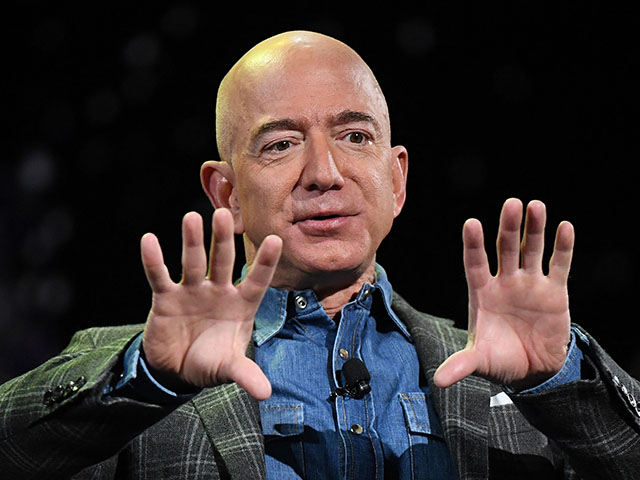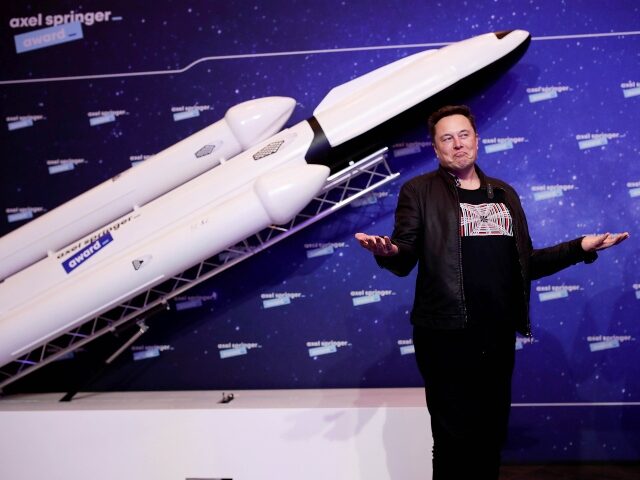Elon Musk and SpaceX have become the target of “lawfare” from the left, particularly Jeff Bezos’ Blue Origin. This targeting is ramping up after the billionaire Tesla CEO and X owner endorsed Donald Trump.
Within minutes of the assassination attempt in Pennsylvania, Elon Musk tweeted, “I fully endorse President Trump.” In so endorsing, Musk has stepped into new territory, where he, too, is a target. We can pray that this targeting won’t include violence—although by his own telling, Musk has already been a target. But we already know that the attacks on Musk include legal and financial “lawfare”
Lawfare is defined as “the use of legal systems and institutions to damage or delegitimize an opponent.” Gee, that’s something Trump knows about, doesn’t he? Now, Musk is going to get the same rough treatment. In fact, as Musk been moving to the right these past few years—even before the July 13 shooting in Pennsylvania, he had donated to the Trump campaign, and plans to donate more—he has already been lawfared, including by a fellow billionaire, Jeff Bezos.
On June 21, Blue Origin, the space company owned by Bezos, launched a legal attack against SpaceX, owned by Musk. In a complaint with the Federal Aviation Administration, an arm of Pete Buttigieg’s Department of Transportation, Blue Origin demand an environmental impact statement (EIS) for Musk’s rocket launches..
The stakes are higher than the sky, for three reasons; first, Blue Origin’s lawfare attack threatens to slow down, and perhaps paralyze, a big company (SpaceX is valued at some $210 billion), and a bigger industry, space launches and satellites; second, it’s part of a proxy war between Joe Biden and Trump, with Bezos fronting for the Democrats and Musk helping Republicans; third, it could slow down the overall American-led advance of humanity into space. It’s profound and vital, both, that we become a spacefaring civilization.
Yet all this could be lost—or at least slowed, leadership defaulting to an evermore aggressive China—if Bezos and his lawyers get their way.
We all know about EIS; for half a century, they’ve been used by NIMBYs, Naderites, and naysayers to block development. The most notorious recent example of this green bushwhacking is California’s High Speed Rail project, that $100 billion boondoggle, so tangled up in EIS and folderol that it has become a never-to-be-completed train to nowhere.
Now Bezos and Blue Origin want to do the same thing to SpaceX. After listing every possible outcome that high-paid lawyers can think of, the complaint states, “Accordingly, the EIS should thoroughly evaluate the considerable risks, alternatives, mitigations, and resources listed below.” That would take years, and many millions of dollars—but that’s the point. This is legal monkeywrenching.

Amazon Founder and CEO Jeff Bezos addresses the audience during a keynote session at the Amazon Re:MARS conference on robotics and artificial intelligence at the Aria Hotel in Las Vegas, Nevada on June 6, 2019. (Photo by Mark RALSTON / AFP) (Photo by MARK RALSTON/AFP via Getty Images)
Musk responded immediately, via X, “Not cool of them to try (for the third time) to impede SpaceX’s progress by lawfare.” And then he added a dig, punning the name of Bezos’ company: “Sue Origin.”
Lest anyone not get the joke, Musk’s Grok AI observed, “The phrase ‘Sue Origin’ could be interpreted as a sarcastic way of saying that Blue Origin has a history of resorting to legal action rather than competing fairly in the marketplace.” To which Musk appended the emoji, bullseye.
In the meantime, if we measure performance in space, as opposed to tactics in the courtroom, the gap between the two companies is wide.
Blue Origin, founded in 2000, has yet to launch a single rocket into orbit. Yet if Bezos & Co. lack technical proficiency, they try harder on legal pettifoggery, and lobbying swampery. In 2021, Bezos Origin sued NASA to get a contract, only to lose in court. Whereupon Bezos went into swampy overdrive, hiring lobbyists he had used to get a legally cloudy cloud-computing deal from the Pentagon. At the time, Musk sniped, “He should consider spending some money on actual lunar lander hardware, instead of shady lobbyists.” And oh yes, Blue Origin prides itself on diversity.
Moreover, Bezos has another kind of mojo: Most of his campaign contributions have been to Democrats, and the pro-Democrat tilt of Amazon employees is even starker. Which makes us think: The name of the color in Bezos’ space company—could that be some sort of tell?
Also, in 2013, Bezos bought the Washington Post, and in 2018 he bought the largest mansion in D.C., not far from Barack Obama’s spread. Bezos and his billions mean to wheel and deal in Powertown.
Acknowledging the mogul’s pull, in 2023 NASA gave Blue Origin a lunar lander contract. The cold headline in Futurism: “NASA Awards Sore Loser Jeff Bezos a Consolation Prize Moon Contract.”
Musk’s company operates differently. Founded two years after Blue Origin, SpaceX has been an enormous success, in getting into orbit, in everything, space-wise. Just in 2024, it has launched 69 rockets with a 100 percent success rate; it’s aiming for 150 by the end of this year.
Indeed, SpaceX is so good that just in June, NASA awarded the company an $843 million contract to safely “de-orbit” the decrepit International Space Staton, which could pose a hazard if it fell on a populated area.
Yet unlike Bezos, Musk has little interest in Washington, D.C. A few years ago, he fled California and now lives in Texas, where the locals welcome entrepreneurs and go-getters. In 2022, as we all remember, he bought Twitter, fired 80 percent of its woke-deadwood staff, and reasserted that the platform, renamed X, would be a place for free speech. As a further good cleansing measure, Musk released the Twitter files, the internal documents from the bad old days showing how Deep State operatives worked with Twitter employees to suppress “disinformation”—such as Hunter Biden’s very real laptop.
Conservatives should cheer for Musk, but Democrats have been paying attention—and they are looking for payback.
Hence the contrast: Bezos is happy paddling in the Potomac, suing to get his piece of the porkpie, while Musk, deep in the heart of Texas, is looking up to the stars, building an epic company—and blazing a Christopher Columbus-level trail in history.
So of course Blue Origin and many Democrats want to use EIS to kneecap SpaceX.
The irony is that in his better moments, Bezos himself has seen the transcendent potential of star trekking. As a Princeton undergraduate, he studied under space visionary Gerard O’Neill; he has since said he looks forward to “trillions” of people living in space. Given that the Earth’s population is “only” eight billion, that’s an exponential increase in the number of people alive, and they’d be living in space. Aside from this general coolness, it’s a humdinger of an investment prospect. In the spacefaring future, all those people working, making, and inventing. We’ll have to get used to some new metrics for dollar totals: quadrillion, quintillion, sextillion…
Yet these future gains could all be lost, like tears in rain, if Musk and his fellow visionaries are hobbled by green shackles, such as EIS. It’s already happening, to some extent: Musk has expressed vexation at the nagging efforts of the U.S. Fish and Wildlife Service—a unit of the very green, very Bidenized Department of the Interior—to slow down his rocket launches. As if on cue, on July 7, the New York Times joined in on the lawfare attack, expressing great concern about the piping plovers (a kind of bird).
It‘s easy to see more MSM entities, and activist groups, joining in, including liberal allies in Europe attacking X.
But what’s nearest and dearest to Musk is going to space. And going to space requires rocket launchers. So these lawfare attacks on Musk’s launches are a potentially mortal threat to that enterprise. If the ultimate effect of green lawfare is to drive SpaceX out of Texas, or out of the U.S.—or out of business altogether—that’d be fine with liberals.
For his part, Musk has treated the campaign against him with humor, even as his company offers detailed responses to concerns about three piping plovers.
In the meantime, Americans need to decide. Which is more important: Getting to space, or filing more lawsuits?
Happily, the outward bound are rising to Musk’s defense. Spacenik Robert Zubrin tweeted, “Disgraceful action by Blue Origin.” Joe Lonsdale, the Trump-endorsing venture capital legend, let loose: “Blue Origin with the ultimate loser crony note. Very anti-space economy, and decel [deceleration, as opposed to acceleration]. Reminiscent of retail trying to block the ‘impact’ of e-commerce. Shameful, @JeffBezos.” As of the second week of July, Blue Origin has had nothing to say in response. Why should it, if the New York Times and the MSM are doing the heavy lifting?
If Donald Trump wins this November, it’s a safe bet he’ll restrain the ability of legal saboteurs to use EIS to stymie development—in terms of space launches, or anything else. Indeed, the Republican Party platform, released on July 8, expresses high hopes for space. Under the heading, “Expanding Freedom, Prosperity and Safety in Space,” the document pledges,
Under Republican Leadership, the United States will create a robust Manufacturing Industry in Near Earth Orbit, send American Astronauts back to the Moon, and onward to Mars, and enhance partnerships with the rapidly expanding Commercial Space sector to revolutionize our ability to access, live in, and develop assets in Space.
Those words should give Musk and other space investors the confidence they need to bet big.
Yet Trump can’t be president forever, and Republicans won’t be in power forever. So the separate states have a role to play, if they wish, in safeguarding their rocket industry. Florida and Texas, the states where SpaceX launches most of its rockets, should take affirmative legal and legislative steps to guarantee that the feds can’t ever come a knockin’. (SpaceX also launches from California, but we can assume that greens there will shut that down soon enough.)
So Musk needs a permanent legal shield—a fed-free enterprise zone—for space launches. And for the sake of the space economy and space strategy, all of us need that. To be sure, this shielding effort will entail a legal and political fight, pushing back against the lawfarers, but we’re worth the effort.
Florida and Texas as the spaceports for the next million rocket launches. That’s winning the future here on earth, as well as in space.

COMMENTS
Please let us know if you're having issues with commenting.